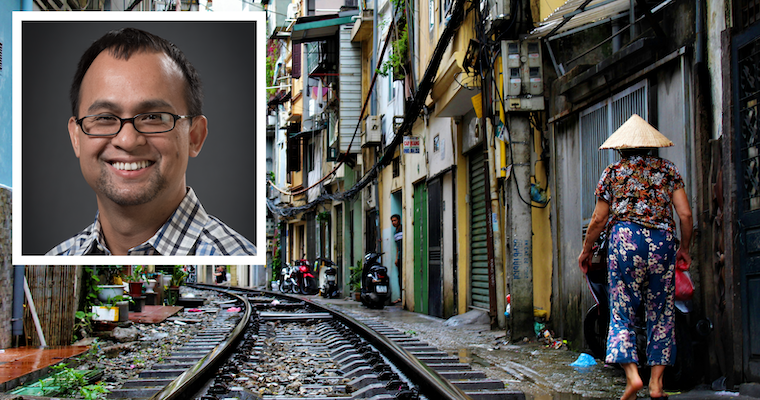
Vietnam Using Pandemic Lessons to Win the Global Tech Race, According to Leavey Associate Teaching Professor Long Le
As Covid-19 spread around the world, researchers from the Global Health Security Index predicted that developing countries would be among the worst hit and have the hardest time recovering. Yet Vietnam, a single-party autocratic and low-middle income country which was indexed as one of the least prepared countries, unexpectedly out-performed most democratic and autocratic countries in the initial and later stages of Covid-19.
In fact, in the midst of the pandemic, Vietnam was Asia’s top performing economy and positioned itself to be among the fastest growing economies in the post-pandemic world.
“I’ve always been interested in Vietnam and the way it has utilized state capitalism to create pathways to catch up with their advanced neighbors like China and whose national priorities include becoming part of the G-20 by 2030,” says Long Le, Associate Teaching Professor and Director of the International Business Minor at the Leavey School of Business. “Then, when Covid hit and Vietnam surpassed expectations of their handling of the virus, it was the perfect contribution to the debate my co-authors and I were having about advancing the varieties and variations of state capitalism in international business management.”
Le’s research explores the dimensions of Vietnam’s governance system. It found that the country’s stateness – strong and strategic policies and action – had the foresight in investing in universal health care and surveillance systems to detect outbreaks such as avian influenza. The research also found that the deliberate growth of the size of government and the strategic balance between the freedom to trade internationally and growth of sound money was directly correlated with its successful management of Covid-19.
Further, it presents how state capitalism in democratic countries like Indonesia and India can absorb Vietnam’s dimensions of stateness. For example, such countries could prioritize the functioning of markets, building capacity for health equity, and actualize their desired national interests, rather than putting the politics of populism ahead of economic growth and public health.
Le’s research advocates that in the varieties of state capitalism, all countries have the political capacity and policy learning to advance in the global trade system and thrive as well as to contribute to the multipolar global order. Moreover, the variations of state capitalism allow for comparison and for countries to learn from one another, without pinning one against the other in a zero-sum fashion.
With the worst of the Covid pandemic behind us, Vietnam is leveraging its stateness to surpass competitors in another critical area: the global technology race.
Le’s research shows that Vietnam has leveraged its policy learning and diplomacy over the years and is now using it to push ahead in the areas of high-tech trade, transportation infrastructure, start-up ecosystem, labor productivity, as well as universal education and public health. However, he notes that in other dimensions such as human rights and civil society, Vietnam has not made progress.
While the advances Vietnam is able to make due to its stateness are impressive, it’s important to note the critical issues to this type of government. Restrictions on fair elections, civil society, and freedom of expression in the authoritarian state reduces the opportunity for public engagement and the ability to address issues like government corruption, labor rights, and use of child labor for fear of retaliation. Observers have also noted that autocratic governments that are effective and efficient tend to have “short expiration dates,” and are more susceptible to political upheavals starting at the top.
Le describes Vietnam as entrepreneurial in being able to transform the country through combinatorial innovation. “They’re able to work creatively, with less resources, seek partnerships, and fill voids in innovative ways to achieve their goals. With US-China trade relations growing tense, Vietnam’s goal is to become a viable replacement and emerge as a more stable supply chain base for US tech companies like Apple, Nvidia, Microsoft, and Tesla.”
As Vietnam, and other Southeast Asian countries, progress from exporting textiles and garments and emerge as a center of gravity of the high-tech industry, Le hopes that in tandem with his research, people can let go of preconceived ideas of state capitalism, acknowledge the variations and their benefits, and adopt successful dimensions across autocratic and democratic countries around the world.
Continuing his research on how state capitalism is used to solve countries’ biggest problems, Le’s next paper will focus on how state capitalism affects poverty reduction, climate change, and avoiding the middle-income trap.
Le’s research Exploring Vietnam's State Capitalism as Immanent Potentiality: How a Single Party System's Management of Covid-19 put Democracies and Autocracies to the Test will be published in the Journal of Vietnamese Studies.
